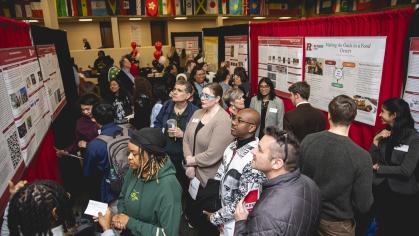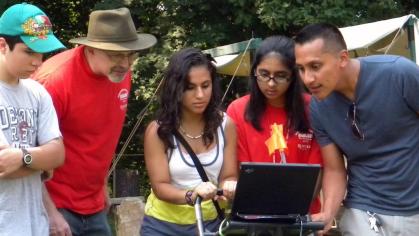Rutgers Office for Research Announces Inaugural Recipients of Nokia Bell Labs Scholarship
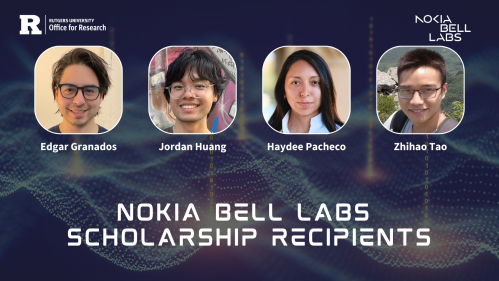
Four Rutgers students were named inaugural recipients of its Nokia Bell Labs Scholarship, a program that supports promising postgraduate trainees in the fields of artificial intelligence, machine learning, computer science, engineering, networking, and communications.
The winners are doctoral candidates Edgar Granados (Rutgers-New Brunswick School of Arts and Sciences), Jordan Huang (Rutgers-New Brunswick School of Arts and Sciences), Haydee Pacheco (School of Engineering), and Zhihao Tao (School of Engineering). Click here to read about their research focus.
“Congratulations to these four amazing students on receiving the Nokia Bell Labs Scholarship,” said Michael E. Zwick, PhD, senior vice president for research. “This scholarship highlights how the relationship between higher education research institutions and industry can advance innovative technologies that will make a positive impact on the world. I am excited to see what Edgar, Juana, Jordan, and Zhihao will accomplish.”
“Thank you to Nokia Bell Labs for supporting these four amazing students with this scholarship,” said Marika Dunn, PhD, executive director of the Research Relationships unit within the Office for Research. "We had so many amazing applicants, Nokia Bell Labs granted our request to increase the number of recipients from three to four, and we are honored to support the research of our four winners."
The Nokia Bell Labs Scholarship is a program sponsored by Nokia Bell Labs in partnership with select universities in the U.S. and abroad. Rutgers will provide $10,000 to each recipient during a one-year term; they will also be eligible for mentorship opportunities with Nokia Bell Labs researchers, and they will be invited to Nokia Bell Labs-sponsored lectures and other events. To learn more about the scholarship, click here.
"Our partnership with Rutgers University allows us to foster the growth of the next generation of innovators who are driving technological advancements that will positively impact the world," said Dr. Thierry E. Klein, President, Bell Labs Solutions Research at Nokia. "With our Nokia Bell Labs headquarters in New Jersey, we are committed to actively engaging with young talent to provide them with the support and opportunities to succeed and make a meaningful impact on the future."
2025 Rutgers Nokia Bell Labs Scholarships Recipients
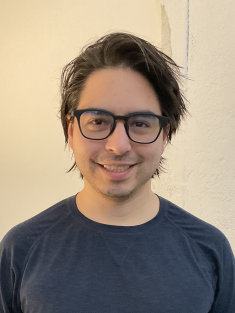
Edgar Granados, Rutgers-New Brunswick School of Arts and Sciences, Computer Science:
“Reliable robotic systems must implement motion planning, state estimation, and control algorithms, and a robot model is needed. These operations are typically addressed independently and can lead to unsafe execution due to sensing and actuation noise and discrepancies between the model and reality. While sensors and actuators keep improving, and system identification techniques can reduce the model gap, the discrepancies persist, for example, in unmodeled environments or due to wear and tear.
“My research seeks to integrate these methods by using factor graphs as a common framework. Factor graphs provide significant advantages by enforcing the problem's structure while allowing explainability. Specifically, factor graph representations of the robot dynamics allow significant speed-ups of optimization algorithms for state estimation and control. For long-horizon planning, however, a kinodynamic motion planner is needed, where the planner must produce the factor graph to be used by the state estimation and control algorithms. A common representation, from system dynamics to planning, allows for computationally efficient and explainable algorithms without sacrificing accuracy.”
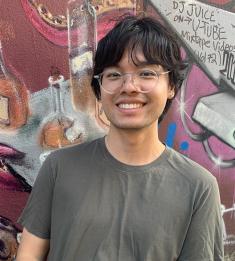
Jordan Huang, Rutgers-New Brunswick School of Arts and Sciences, Physics and Astronomy:
“Quantum computers require the ability to control quantum systems and implement error correction. My research focuses on controlling photon modes in superconducting cavities. I am developing and implementing techniques to do fast gates on information stored in these photon modes by using superconducting circuits. I am then applying these techniques to explore device architectures that implement random-access quantum memory processors.”
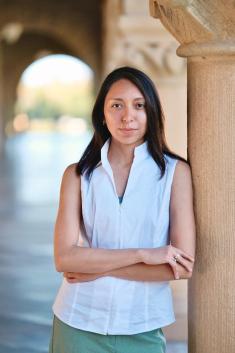
Haydee Pacheco, Rutgers School of Engineering, Materials Science and Engineering:
“My dissertation research focuses on advancing light-based technologies by integrating plasmonic nanostructures into thin films and optoelectronic devices. Plasmonics allows us to control light at the nanoscale—below its diffraction limit—by confining it to conductive nanostructures. I study and develop various approaches, including the use of organic conductive materials with exceptional optical and electronic properties, to enhance light-matter interactions. My work enables tunability and modulation of the optical response of these materials to dynamically control light propagation and emission. This research bridges fundamental materials science with real-world applications, contributing to the development of energy-efficient and miniaturized photonic technologies.”
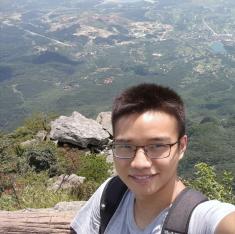
Zhihao Tao, Rutgers School of Engineering, Electrical and Computer Engineering:
“My research interests include digital signal processing, wireless system designs, and deep learning. Specifically, my dissertation research focuses on exploiting signal processing and generative AI to enhance the security and privacy of next-generation wireless communication and sensing systems.”

